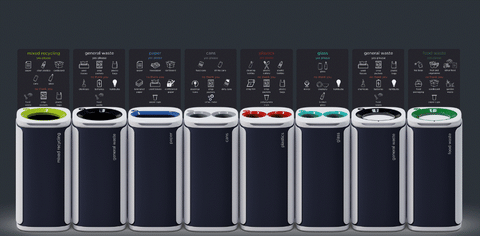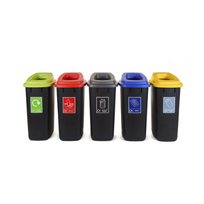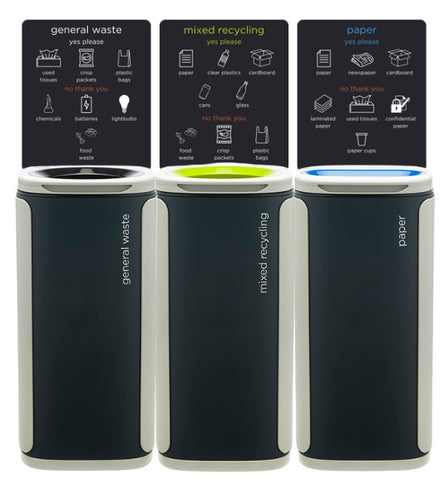Why not add these to compliment your wheelie bins?
Your basket is currently empty.
Shop NowWe guarantee to have the lowest price! Find the same bin for a cheaper price and we will beat it!

Office bins can easily get overlooked when it comes to planning out workspaces and recycling systems. Choosing the right bins for your work environment is in fact integral to keeping office spaces clean, green, and organised. The more employees in your offices, the more potential to create waste. According to recent research carried out by the Chartered Institute of Procurement and Supply, UK businesses lose up to 5% of annual turnover through avoidable waste. This makes it all the more important to consider the office bins and recycling practices in your workplace. In this guide, we share:
With stricter UK regulations coming into force in favour of having waste management solutions properly implemented in businesses, choosing the right office bins is extremely important. At Litter Bins, we stock hundreds of office bins to enable you to get started with waste collection and office recycling in your commercial space.
You may well be wondering why you can’t stick with simply having individual waste bins in the office, and why you need to go through the process of setting up an office recycling system. There are a few key reasons why it’s essential for workplaces moving forward:
Getting started with office recycling may feel like an intimidating task, but the benefits can be endless:
It can be confusing to understand what can and can’t be recycled, especially with so many different materials and waste channels. Common materials that can be recycled within the office include the following:

Each of these materials requires indoor or outdoor recycling bins as well as the relevant agreements with your waste carrier. Clear signage and colour coding can help your employees to separate these items. There are a few steps you can take to better understand which materials in your office can be recycled:
Another essential layer you’ll need to consider when it comes to ordering your office bins and recycling system is industry regulations. Every business has a number of responsibilities to meet within the workplace. It will vary slightly depending on which country your business is located in, the amount of waste, the frequency of collection, and the type of waste. Here’s a roundup of the key UK legislation and government guidelines for workplace recycling:
Unfortunately, the rest of the UK varies slightly.
There are a few different elements that go into implementing your office recycling system, but it doesn’t need to be complicated. From choosing the best office bins for your workplace to getting your employees on board with recycling, we’ve listed out our recommended strategies to getting started.
Before you can really get started with choosing which office bins or recycling stations you need, you need to create a recycling plan for your business. In your plan, you should include the following:
Once your waste recycling stations and office bins have been chosen, you’ll need the buy-in from your employees for the system to really work. A good way to introduce this is to appoint a number of recycling advocates to champion the new system to their colleagues. All team members will need to understand why recycling and waste separation is key, and the advantages not only for the business but as a positive action for themselves. Here are a few key ways to implement a change in mentality to office recycling:
Naturally, it takes time to shift the mentality on recycling and to transition from defaulting to throwing things into waste bins to separating waste efficiently. Give employees sufficient time to get used to separating waste, and have your recycling stations ready before removing waste bins. Gradually, you can remove waste office bins so staff have no choice but to use centralised recycling systems. This period of transition will help staff slowly get used to the changes and reprogram their methods of waste disposal. You should allow for this transition period as part of your recycling plan.
Now that you have a clearer idea of what you’ll be recycling in your workplace and your goals in mind, you’ll need to consider the recycling equipment you need in place to achieve change. Think realistically about the sufficient quantity of units you’ll require for the number of employees. One recycling station for every 30 employees is typically a good rule of thumb. When it comes to choosing office bins, you should ensure they’re visible to inspire your employees and encourage them to recycle. Bright colours can help when it comes to waste sorting, provided they’re consistent with your waste provider’s specifications.

One of the key pieces of recycling and waste separation equipment you’ll need for your workplace is office bins. There are a number of simple questions you need to ask when buying office bins for your workplace. Nobody wants to spend money on office bins that aren’t fit for purpose. The following considerations will help you to choose the right office bins for your commercial spaces:
You should first ask yourself who will actually be using the office bins? Staff, or visitors too? How many employees do the bins need to cater for? Are you an educational workplace, where many different types of waste will be disposed of? Which materials need to be sorted - paper, plastics, and glass? If confidential information needs to be disposed of, lockable office bins may be a requirement. If your workplace has kitchens and breakout areas, food waste disposal bins will be necessary, as well as having lids on your bins to prevent odours. Do you have any hazardous waste to be disposed of, like batteries or ashtrays? For different types of waste, having selective sorting sections in your office bins for waste separation will save hours. Answering these questions will help you to establish the criteria necessary for the office bins and waste sorting systems needed in your workplace.
The amount of waste created depends, of course, on your operations and the number of people in your commercial space. You will want a good estimation of the anticipated volumes of waste so you choose office bins with appropriate capacity. This is where a waste audit is crucial to help you understand how much waste and the types of waste produced by your business. Capacity is often dependent on the frequency with which your office bins will be emptied. If this is less often than you’d like, larger capacity bins may be essential. At Litter Bins, we stock office bins in all kinds of sizes and capacities, but having a good understanding of these factors will make your requirements much clearer.
How large are your offices? Is the space spread out or open plan, and have you considered the office bin to people ratio in your workspace? It’s important to think about the available space so that you can make a good estimation as to the amount of waste collection units that you will need. Would an office recycling station offer the more sophisticated recycling setup that you need, with a straightforward separation of different waste and recyclables? Nobody wants a huge bin for a small office space, and equally bins that are too small and won’t be emptied frequently can prove frustrating and inefficient. Consider the waste you’re dealing with, and the quantity of office bins required. Perhaps you’ll need office recycling bins at each desk bank for sorting paper and cardboard, and a separate bin for food waste in the kitchen area, for instance.
While office bins are functional, nobody wants an eyesore in their boardroom. With so many styles of office bins available, you should consider office bins that will blend seamlessly into your office environment. Putting practical requirements first, have a look at the different styles that might work best for your office areas. The frequency of emptying will help you to determine the style of bin required too. If, for example, your office waste bins are emptied each day, a sleek office bin that fits easily under each desk may work wonders. Smart stainless steel bins may complement your meeting rooms, instead of bulkier, coloured plastic bins. Our diverse range of office bins at Litter Bins means you can choose the right style for your individual workspace in a way that’s both stylish and practical. We offer a selection of materials, no matter what the function of your office bin:

While we all wish we had an endless budget to choose the perfect products for what we need in our businesses, we understand you’ll likely be capped by a budget for implementing your waste collection and recycling solutions. Thankfully, at Litter Bins we have a wide range of great value office bins to suit all purposes. From budget bins to stylish high end models, our wide choice caters to all budgets and commercial spaces.
Adding some accessories to your office bins can make the world of difference when it comes to signage for waste separation or maintaining effective waste collection. Here are a few of our recommendations:
Your office bins will probably be in frequent use by employees and visitors, but it’s essential to clean and maintain them efficiently so they remain useful and safe. Here are a few steps to looking after your office bins:
Due to the incoming simpler recycling legislation we are experiencing a huge increase in demand. All orders are being processed as fast as possible, but there is a delay of around 2-3 weeks at present. We will respond to all emails as soon as we can but please bear with us as we work through the backlog.